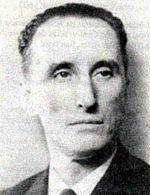Eduardo Cruz-Coke, Date of Birth, Place of Birth, Date of Death
TweetEduardo Cruz-Coke
Chilean politicianAbout Eduardo Cruz-Coke
- Eduardo Cruz-Coke Lassabe (April 22, 1899 – March 18, 1974) was a Chilean political figure, the conservative candidate in Chile's 1946 presidential election and the principal creator of the Chilean health system. Cruz-Coke was born in Valparaíso, Chile, the son of Ricardo Cruz-Coke and of Celeste Lassabe.
- He completed his secondary studies at the Padres Franceses in Santiago, and later graduated as a medical doctor from the Universidad de Chile in 1921.
- While still a student, Cruz-Coke together with classmate Emilio Tizzoni, founded the National Association of Catholic Students (Spanish: Asociación Nacional de Estudiantes Católicos) (ANEC) based on the Catholic social teachings.
- Cruz-Coke became its first president, and in 1920 he joined the Conservative party. After working as a microscopy assistant to professor Juan Noé, in 1925 he became professor of physiology and pathology at the same university, a position he retained until 1955.
- The same year, he travelled to Berlin to a sexology congress and remained in Europe studying for a year.
- At his return, he founded the Society of Biology of Santiago in 1928.
- Between 1927 and 1937 he was Chief of Medicine at the San Juan de Dios Hospital. Between 1937 and 1938 Cruz-Coke served as Minister of Public Health, Social Assistance and Welfare appointed by President Arturo Alessandri.
- During his tenure, Cruz-Coke implemented a health program based upon a strictly scientific (as opposed to politic) approach to tackle the main health challenges, particularly maternal and infant mortality.
- He was the force behind Law 6026 (for Mother and Child) and Law 6174 (of Preventive Medicine).
- He set up a "National Food Council" (Spanish: Consejo Nacional de Alimentación) that defined innovative policies to improve the alimentary weaknesses, particularly among the low-income sectors, and organized the Preventive Medicine Services to diminish labour sickness.
- The measures had a positive impact in Public Health indexes and were followed by its successors. In 1941, Cruz-Coke was elected a senator for Santiago and was reelected in 1949.
- In 1946, he was proclaimed presidential candidate by the Conservative party, but a split of his voting base between him and Fernando Alessandri resulted in the triumph of Gabriel González Videla, with Cruz-Coke finishing in second place.
- In 1948, Cruz-Coke founded the Social Christian Conservative Party. After the end of his senatorial term in 1957, he decided not to run for reelection.
- In 1958 he was named Ambassador to Peru, where he remained until 1960.
- In 1963 he was named the first president of the newly established National Committee on Atomic Energy (Spanish: Comisión Nacional de Energía Atómica), and in 1965 produced the first plan for the use of nuclear power in the mining industries of the north of Chile.
- He died in Santiago, in 1974, at the age of 74.
Read more at Wikipedia
See Also
- Famous People's Birthdays on 22 April, Chile
- Famous People's Birthdays in April, Chile
- Famous physician's Birthdays on 22 April, Chile
- Famous physician's Birthdays in April, Chile
- Famous politician's Birthdays on 22 April, Chile
- Famous politician's Birthdays in April, Chile
- Famous diplomat's Birthdays on 22 April, Chile
- Famous diplomat's Birthdays in April, Chile


 Date of Birth:
Date of Birth:  Place of Birth: Valparaíso, Valparaíso Region, Chile
Place of Birth: Valparaíso, Valparaíso Region, Chile